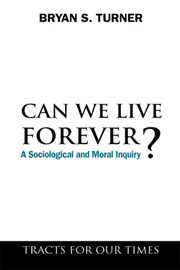Book contents
- Frontmatter
- Contents
- Acknowledgements
- Can We Live Forever?
- Chapter One Longevity and the Population Debate
- Chapter Two The Social Utopia of Human Perfection
- Chapter Three Ancient and Modern Techniques of Longevity
- Chapter Four The Political Economy of Ageing
- Chapter Five The Moral and Spiritual Character of Old Age
- Chapter Six Vulnerability and the Ethic of Care
- Chapter Seven Towards a New Paradigm of Ageing
- Chapter Eight The Aesthetics of Ageing
- Bibliography
- Index
Chapter Four - The Political Economy of Ageing
Published online by Cambridge University Press: 05 March 2012
- Frontmatter
- Contents
- Acknowledgements
- Can We Live Forever?
- Chapter One Longevity and the Population Debate
- Chapter Two The Social Utopia of Human Perfection
- Chapter Three Ancient and Modern Techniques of Longevity
- Chapter Four The Political Economy of Ageing
- Chapter Five The Moral and Spiritual Character of Old Age
- Chapter Six Vulnerability and the Ethic of Care
- Chapter Seven Towards a New Paradigm of Ageing
- Chapter Eight The Aesthetics of Ageing
- Bibliography
- Index
Summary
They were not only Opinionative, Peevish, Covetous, Morose, Vain, Talkative, but uncapable of Friendship, and dead to all Natural Affection, which never descended below their Grandchildren.
— Jonathan Swift, Gulliver's TravelsIntroduction: The Demographic Threat
Let us simply assume that by 2050 the average life expectancy in the developed world will have increased by another ten years to around 90 years of age. The life expectancy of Japanese women will by then be well over 90 years. As a result, there will also be a dramatic increase in centenarians. We might reasonably assume by then that modest improvements in geriatric medicine and in the public provision of healthcare will reduce the misery of old age. These modest assumptions appear to be more realistic than Aubrey de Grey's assertions about an indefinite extension of life and rejuvenation. But let us consider the social and economic implications of both modest but continuous increases in life expectancy on the one hand, and a dramatic increase in longevity on the de Grey predictions on the other. How will advanced industrial societies respond effectively to either scenario?
What is problematic about the current prolongevity debate is that its champions rarely discuss the political economy of ageing – who will pay for it, what will be the unintended consequences, and how would it change the balance of power between generations or indeed between nations. One reason for this absence of any serious attempt to understand the social consequences of living forever is that the ideological underpinnings of the Immortalist movement are entirely individualistic and consistent with the values of the Baby Boomer generation that celebrate youth.
- Type
- Chapter
- Information
- Can We Live Forever?A Sociological and Moral Inquiry, pp. 69 - 88Publisher: Anthem PressPrint publication year: 2009



